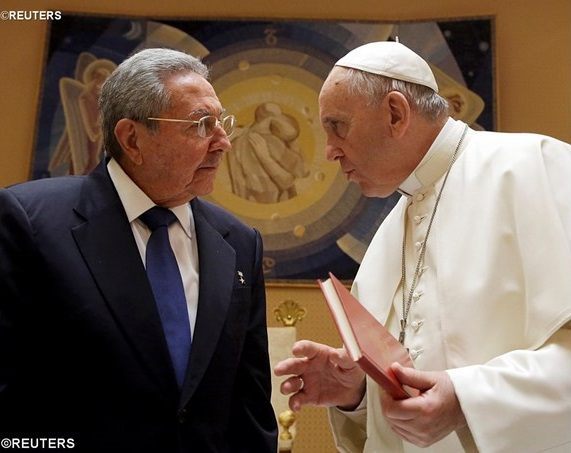Visiting Pope Francis in Vatican City Sunday, Cuban President Raúl Castro thanked him publicly for the role he played in mediating relations between Cuba and the United States this past year.
Leaders of both countries have credited the Pope with helping to ease tensions and overcome obstacles between them.
The Vatican issued a statement last December, expressing Pope Francis’ “warm congratulations for the historic decision taken by the Governments of the United States of America and Cuba to establish diplomatic relations.” The statement also confirmed that Pope Francis had written letters to both Castro and Obama, and “invited them to resolve humanitarian questions of common interest, including the situation of certain prisoners, in order to initiate a new phase in relations between the two Parties.”
The statement further acknowledged that the Vatican “received Delegations of the two countries in the Vatican last October and provided its good offices to facilitate a constructive dialogue on delicate matters, resulting in solutions acceptable to both Parties.”
Castro and the Pope had a 55-minute private meeting Sunday morning in the papal study at the Paul VI Hall, according to a communiqué from the director of the Vatican Press Office, Father Federico Lombardi.
The meeting was described as “very friendly” and, on exiting, Castro told reporters that he had “thanked the Holy Father for the active role he played in favor of improving relations between Cuba and the United States of America” as well as expressing to the Pope the good wishes of the Cuban people who “look forward to his visit to the island next September.”
Later in the day, Castro surprised everyone by saying that he intends to be present for all of the Pope’s Masses during his upcoming visit to the Island, and that he reads all the Pope’s addresses.
“If he continues this way, I will return to the Catholic Church,” Castro said. “Even if I am a member of the Communist party that doesn’t allow believers, we are moving forward.”
Last month the Vatican announced Pope Francis’ intention to visit Cuba ahead of his visit to the United States in September 2015.
A traditionally Catholic country, Cuba suffered significant anti-Christian persecution beginning in 1959 with the Cuban Revolution and Fidel Castro’s rise to power, with many priests jailed or exiled. Now, as relations with the Vatican are beginning to thaw, the Cuban government has authorized the construction of the first new church in 56 years in Sandino, a remote village in the westernmost province of Cuba, Pinar del Río.
After the private meeting the two leaders exchanged gifts, with Castro presenting the Pope a commemorative medal of the Cathedral of Havana and a contemporary work painted by Cuban artist Kcho, and the Pope offering the President a copy of his apostolic exhortation Evangelii Gaudium and a large medallion depicting Saint Martin covering the poor with his cloak.
Follow Thomas D. Williams on Twitter @tdwilliamsrome

COMMENTS
Please let us know if you're having issues with commenting.